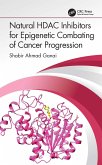Cancer Cell Signaling
Targeting Signaling Pathways Toward Therapeutic Approaches to Cancer
Herausgeber: Ayyanathan, Kasirajan
Cancer Cell Signaling
Targeting Signaling Pathways Toward Therapeutic Approaches to Cancer
Herausgeber: Ayyanathan, Kasirajan
- Broschiertes Buch
- Merkliste
- Auf die Merkliste
- Bewerten Bewerten
- Teilen
- Produkt teilen
- Produkterinnerung
- Produkterinnerung
This title includes a number of Open Access chapters. Cell signaling is a field that studies how cells communicate to control basic activities and respond to their environment. When looking specifically at cancer cells, researchers can gain a better understanding of cancer on a cellular level, an understanding that may have impli
Andere Kunden interessierten sich auch für
![Cancer and Vitamin C Cancer and Vitamin C]() Cancer and Vitamin C127,99 €
Cancer and Vitamin C127,99 €![Handbook of Cell and Gene Therapy Handbook of Cell and Gene Therapy]() Handbook of Cell and Gene Therapy151,99 €
Handbook of Cell and Gene Therapy151,99 €![Applied Pharmaceutical Science and Microbiology Applied Pharmaceutical Science and Microbiology]() Applied Pharmaceutical Science and Microbiology101,99 €
Applied Pharmaceutical Science and Microbiology101,99 €![Handbook of Epigenetics Handbook of Epigenetics]() Handbook of Epigenetics159,99 €
Handbook of Epigenetics159,99 €![Natural HDAC Inhibitors for Epigenetic Combating of Cancer Progression Natural HDAC Inhibitors for Epigenetic Combating of Cancer Progression]() Shabir Ahmad GanaiNatural HDAC Inhibitors for Epigenetic Combating of Cancer Progression111,99 €
Shabir Ahmad GanaiNatural HDAC Inhibitors for Epigenetic Combating of Cancer Progression111,99 €![Synthetic Peptide Vaccine Models Synthetic Peptide Vaccine Models]() Synthetic Peptide Vaccine Models56,99 €
Synthetic Peptide Vaccine Models56,99 €![Learning from the COVID-19 Pandemic Learning from the COVID-19 Pandemic]() Learning from the COVID-19 Pandemic56,99 €
Learning from the COVID-19 Pandemic56,99 €-
-
-
This title includes a number of Open Access chapters. Cell signaling is a field that studies how cells communicate to control basic activities and respond to their environment. When looking specifically at cancer cells, researchers can gain a better understanding of cancer on a cellular level, an understanding that may have impli
Produktdetails
- Produktdetails
- Verlag: Apple Academic Press Inc.
- Seitenzahl: 410
- Erscheinungstermin: 31. März 2021
- Englisch
- Abmessung: 230mm x 152mm x 25mm
- Gewicht: 598g
- ISBN-13: 9781774630839
- ISBN-10: 1774630834
- Artikelnr.: 68101141
- Verlag: Apple Academic Press Inc.
- Seitenzahl: 410
- Erscheinungstermin: 31. März 2021
- Englisch
- Abmessung: 230mm x 152mm x 25mm
- Gewicht: 598g
- ISBN-13: 9781774630839
- ISBN-10: 1774630834
- Artikelnr.: 68101141
Kasirajan Ayyanathan, PhD, received his PhD from the Department of Biochemistry, Indian Institute of Science, one of the premier research institutions in India. Subsequently, at Temple University School of Medicine, Philadelphia, Pennsylvania, USA, he conducted post-doctoral research on the signal transduction by purinergic receptors, a class of G-Protein Coupled Receptors (GPCR), in erythroleukemia cancer cells. Next, he was trained as a staff scientist at the Wistar Institute, Philadelphia, for almost ten years and studied transcription regulation, chromatin, and epigenetic regulatory mechanisms in cancer before becoming an associate professor at Florida Atlantic University (FAU). Currently, he is at the Center for Molecular Biology and Biotechnology as a research associate professor at FAU. He is the recipient of Chern Memorial Award, presented by the Wistar Institute, and Howard Temin Career Research Award, presented by the National Cancer Institute, USA.Dr. Ayyanathan is well trained in molecular biology, cell biology, and biochemistry with main focus on studying transcription factors and gene regulation. He has contributed to several projects such as on the generation of conditional transcriptional repressors that are directed against the endogenous oncogenes to inhibit malignant growth, on the establishment of stable cell lines that express chromatin integrated transcriptional repressors and reporter genes in order to study the epigenetic mechanisms of KRAB repression, and on identification of novel SNAG repression domain interacting proteins in order to understand their roles in transcriptional repression and oncogenesis. Dr. Ayyanathan has published several research articles in peer-reviewed articles in these subject areas.
This title includes a number of Open Access chapters.
Introduction. TGFß-Mediated Suppression of CD248 in Non-Cancer Cells Via
Canonical SMAD-Dependent Signaling Pathways Is Uncoupled in Cancer Cells.
Graded Inhibition of Oncogenic Ras-signaling by Multivalent Ras-Binding
Domains. Direct Inhibition of PI3K in Combination with Dual HER2 Inhibitors
Is Required for Optimal Antitumor Activity in HER2+ Breast Cancer Cells.
Wnt3a Expression Is Associated with MMP-9 Expression in Primary Tumor and
Metastatic Site in Recurrent or Stage IV Colorectal Cancer. Wnt5a Promotes
Migration of Human Osteosarcoma Cells by Triggering a
Phosphatidylinositol-3 Kinase/Akt Signals. FOXA1 Promotes Tumor Cell
Proliferation Through AR Involving the Notch Pathway in Endometrial Cancer.
PKC ¿ Regulates Netrin-1/UNC5B-Mediated Survival Pathway in Bladder Cancer.
Signaling Pathways in the Development of Infantile Hemangioma. STAG2 Is a
Clinically Relevant Tumor Suppressor in Pancreatic Ductal Adenocarcinoma.
Molecular Determinants of Context-Dependent Progesterone Receptor Action in
Breast Cancer. Architecture of Epigenetic Reprogramming Following
Twist1-Mediated Epithelial-Mesenchymal Transition. Stability and Prognostic
Value of Slug, Sox9 and Sox10 Expression in Breast Cancers Treated with
Neoadjuvant Chemotherapy. Combination Therapy of Anti-Cancer Bioactive
Peptide with Cisplatin Decreases Chemotherapy Dosing and Toxicity to
Improve the Quality of Life in Xenograft Nude Mice Bearing Human Gastric
Cancer. Combination of Sulindac and Dichloroacetate Kills Cancer Cells via
Oxidative Damage. Index.
Introduction. TGFß-Mediated Suppression of CD248 in Non-Cancer Cells Via
Canonical SMAD-Dependent Signaling Pathways Is Uncoupled in Cancer Cells.
Graded Inhibition of Oncogenic Ras-signaling by Multivalent Ras-Binding
Domains. Direct Inhibition of PI3K in Combination with Dual HER2 Inhibitors
Is Required for Optimal Antitumor Activity in HER2+ Breast Cancer Cells.
Wnt3a Expression Is Associated with MMP-9 Expression in Primary Tumor and
Metastatic Site in Recurrent or Stage IV Colorectal Cancer. Wnt5a Promotes
Migration of Human Osteosarcoma Cells by Triggering a
Phosphatidylinositol-3 Kinase/Akt Signals. FOXA1 Promotes Tumor Cell
Proliferation Through AR Involving the Notch Pathway in Endometrial Cancer.
PKC ¿ Regulates Netrin-1/UNC5B-Mediated Survival Pathway in Bladder Cancer.
Signaling Pathways in the Development of Infantile Hemangioma. STAG2 Is a
Clinically Relevant Tumor Suppressor in Pancreatic Ductal Adenocarcinoma.
Molecular Determinants of Context-Dependent Progesterone Receptor Action in
Breast Cancer. Architecture of Epigenetic Reprogramming Following
Twist1-Mediated Epithelial-Mesenchymal Transition. Stability and Prognostic
Value of Slug, Sox9 and Sox10 Expression in Breast Cancers Treated with
Neoadjuvant Chemotherapy. Combination Therapy of Anti-Cancer Bioactive
Peptide with Cisplatin Decreases Chemotherapy Dosing and Toxicity to
Improve the Quality of Life in Xenograft Nude Mice Bearing Human Gastric
Cancer. Combination of Sulindac and Dichloroacetate Kills Cancer Cells via
Oxidative Damage. Index.
This title includes a number of Open Access chapters.
Introduction. TGFß-Mediated Suppression of CD248 in Non-Cancer Cells Via
Canonical SMAD-Dependent Signaling Pathways Is Uncoupled in Cancer Cells.
Graded Inhibition of Oncogenic Ras-signaling by Multivalent Ras-Binding
Domains. Direct Inhibition of PI3K in Combination with Dual HER2 Inhibitors
Is Required for Optimal Antitumor Activity in HER2+ Breast Cancer Cells.
Wnt3a Expression Is Associated with MMP-9 Expression in Primary Tumor and
Metastatic Site in Recurrent or Stage IV Colorectal Cancer. Wnt5a Promotes
Migration of Human Osteosarcoma Cells by Triggering a
Phosphatidylinositol-3 Kinase/Akt Signals. FOXA1 Promotes Tumor Cell
Proliferation Through AR Involving the Notch Pathway in Endometrial Cancer.
PKC ¿ Regulates Netrin-1/UNC5B-Mediated Survival Pathway in Bladder Cancer.
Signaling Pathways in the Development of Infantile Hemangioma. STAG2 Is a
Clinically Relevant Tumor Suppressor in Pancreatic Ductal Adenocarcinoma.
Molecular Determinants of Context-Dependent Progesterone Receptor Action in
Breast Cancer. Architecture of Epigenetic Reprogramming Following
Twist1-Mediated Epithelial-Mesenchymal Transition. Stability and Prognostic
Value of Slug, Sox9 and Sox10 Expression in Breast Cancers Treated with
Neoadjuvant Chemotherapy. Combination Therapy of Anti-Cancer Bioactive
Peptide with Cisplatin Decreases Chemotherapy Dosing and Toxicity to
Improve the Quality of Life in Xenograft Nude Mice Bearing Human Gastric
Cancer. Combination of Sulindac and Dichloroacetate Kills Cancer Cells via
Oxidative Damage. Index.
Introduction. TGFß-Mediated Suppression of CD248 in Non-Cancer Cells Via
Canonical SMAD-Dependent Signaling Pathways Is Uncoupled in Cancer Cells.
Graded Inhibition of Oncogenic Ras-signaling by Multivalent Ras-Binding
Domains. Direct Inhibition of PI3K in Combination with Dual HER2 Inhibitors
Is Required for Optimal Antitumor Activity in HER2+ Breast Cancer Cells.
Wnt3a Expression Is Associated with MMP-9 Expression in Primary Tumor and
Metastatic Site in Recurrent or Stage IV Colorectal Cancer. Wnt5a Promotes
Migration of Human Osteosarcoma Cells by Triggering a
Phosphatidylinositol-3 Kinase/Akt Signals. FOXA1 Promotes Tumor Cell
Proliferation Through AR Involving the Notch Pathway in Endometrial Cancer.
PKC ¿ Regulates Netrin-1/UNC5B-Mediated Survival Pathway in Bladder Cancer.
Signaling Pathways in the Development of Infantile Hemangioma. STAG2 Is a
Clinically Relevant Tumor Suppressor in Pancreatic Ductal Adenocarcinoma.
Molecular Determinants of Context-Dependent Progesterone Receptor Action in
Breast Cancer. Architecture of Epigenetic Reprogramming Following
Twist1-Mediated Epithelial-Mesenchymal Transition. Stability and Prognostic
Value of Slug, Sox9 and Sox10 Expression in Breast Cancers Treated with
Neoadjuvant Chemotherapy. Combination Therapy of Anti-Cancer Bioactive
Peptide with Cisplatin Decreases Chemotherapy Dosing and Toxicity to
Improve the Quality of Life in Xenograft Nude Mice Bearing Human Gastric
Cancer. Combination of Sulindac and Dichloroacetate Kills Cancer Cells via
Oxidative Damage. Index.








